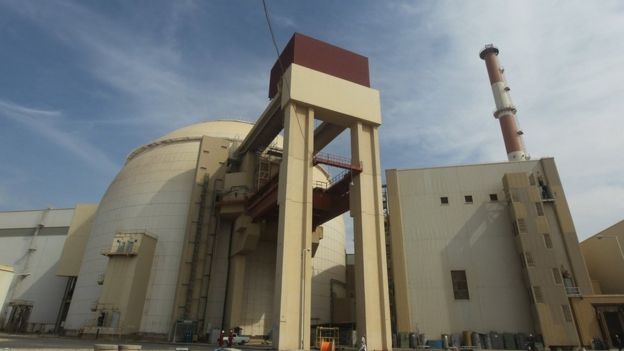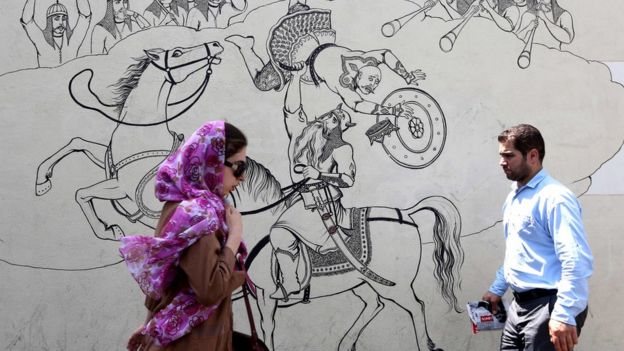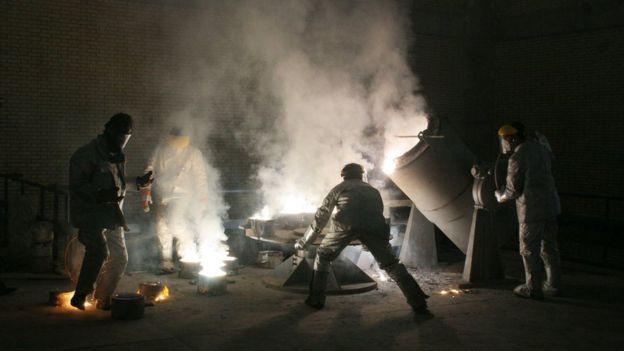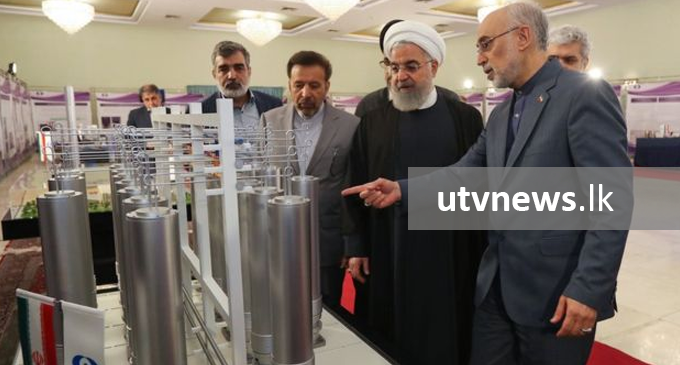(UTv|COLOMBO) – Iran has breached the limit on its stockpile of low-enriched uranium set under a 2015 nuclear deal with world powers, a watchdog has confirmed.
The International Atomic Energy Agency said its inspectors had verified the 300kg (660lb) cap had been exceeded.
Iran stepped up production of enriched uranium, used to make reactor fuel but also potentially nuclear bombs, in May.
It said it was responding to sanctions reinstated by the US after President Donald Trump abandoned the deal.
The UK and Germany have called on Iran to reverse its decision, while the US said its strategy of “maximum pressure” would continue.
European nations had warned that any violation would bring consequences, and the deal allows for the re-imposition of multilateral sanctions that were lifted in return for Iran limiting its nuclear activities.
The development comes at a time of high tension in the Middle East, with Iran shooting down a US drone over the Strait of Hormuz in disputed circumstances, and the US accusing Iran of being behind two sets of attacks on oil tankers.
What has Iran said?
Iranian state media cited Foreign Minister Mohammad Javad Zarif as confirming on Monday afternoon that the limit on its stockpile of uranium enriched to 3.67% concentration – the level required for civilian nuclear power – had been breached.
“Our next step will be enriching uranium beyond the 3.67% allowed under the deal,” he said. “The Europeans have failed to fulfil their promises of protecting Iran’s interests under the deal.”


He noted that the nuclear deal – officially known as the Joint Comprehensive Plan of Action – said a party could “cease performing its commitments… in whole or in part” in the event of “significant non-performance” by any of the other parties.
But Mr Zarif also stressed that Iran’s measures were “reversible” if the Europeans began abiding by their commitments.
The Iranian foreign ministry’s spokesman said enrichment beyond 3.67% would start in 10 days unless European powers took “practical and tangible steps” to implement their new mechanism for facilitating trade and shield the Iranian economy from the effects of the US sanctions.
The mechanism, known as Instex, essentially allows goods to be bartered between Iranian and foreign companies without direct financial transactions. It became operational on Saturday, but Mr Zarif said it did not meet Iran’s needs.
What has been the reaction?
The UK – one of the five other countries still party to the deal along with France, Germany, China and Russia – said it was “urgently considering next steps”.
“The deal makes the world a safer place by taking the prospect of a nuclear armed Iran firmly off the table,” a spokesman for Prime Minister Theresa May said.


“We have been consistently clear that our commitment to the JCPOA depends on Iran complying in full with the terms of the deal and we urge them to reverse this step,” he added.
UN spokesman Stephane Dujarric said that “such action by the Islamic Republic of Iran would not help preserve the plan, nor secure the tangible economic benefits for the Iranian people”.
Russian Deputy Foreign Minister Sergei Ryabkov called Iran’s move a cause of regret, but said it “should not be dramatised”.
“It should be seen as a natural consequence of all the events that preceded these circumstances,” he was quoted as saying by the Interfax news agency. “Effectively, we are talking about a total oil embargo, an attempt to strangle a sovereign state.”
Israeli Prime Minister Benjamin Netanyahu called on European parties to reinstate sanctions on Iran in line with the nuclear deal.
What is enriched uranium?
Enriched uranium is produced by feeding uranium hexafluoride gas into centrifuges to separate out the most suitable isotope for nuclear fission, called U-235.


Under the nuclear deal, Iran is only permitted to produce low-enriched uranium, which has a 3-4% concentration of U-235, and can be used to produce fuel for nuclear power plants.
Weapons-grade uranium is 90% enriched or more.
The deal also restricted Iran to stockpiling no more than 300kg of the low-enriched uranium.
A stockpile of 1,050kg, however, could be further enriched later into enough material to build one bomb, according to the Arms Control Association.
Iran strongly denies any intention to build nuclear weapons.
Why has Iran breached the stockpile limit?
In May, after the US ended exemptions from penalties for countries still importing Iranian oil – and those exchanging surplus Iranian low-enriched uranium for ore concentrate – Iranian President Hassan Rouhani announced that it would no longer comply with the 300kg enriched uranium cap.
Mr Rouhani also gave the five countries still party to the deal – the UK, France, Germany, China and Russia – until 7 July to meet their commitment to shield Iran from the sanctions’ effects.
If they failed, he said, Iran might start enriching uranium beyond 3.67% concentration, and also halt the redesign of a heavy-water nuclear reactor at Arak.
Why does this matter?
The nuclear deal is likely to collapse if Iran is found to be in “material breach” as a result of violating the stockpile limit or other restrictions on uranium enrichment.
After 30 days, any of the other parties would be able to “snap back” the UN sanctions lifted under Security Council Resolution 2231, which endorsed the deal. Such a step cannot be vetoed.
Iran’s threat to enrich uranium beyond 3.67% is also a major concern from a proliferation standpoint.
Iran insists its nuclear programme is peaceful, but experts say 20% enriched uranium is most of the way to weapons-grade uranium. That is because going from uranium’s natural state of 0.7% concentration of U-235 to 20% takes approximately 90% of the total effort required to get to weapons-grade.
The Arak reactor is also a proliferation risk because if it is not redesigned it will produce spent fuel containing plutonium, which could be used for a nuclear bomb. (BBC)
[alert color=”faebcc” icon=”fa-commenting”]Keeping up to date with breaking news while you are on the move is now simple with UTV Alerts [textmarker color=”8a6d3b”]Type REG UTV and send to 77000[/textmarker] on your Dialog, Airtel, or Hutch mobile connection[/alert]

